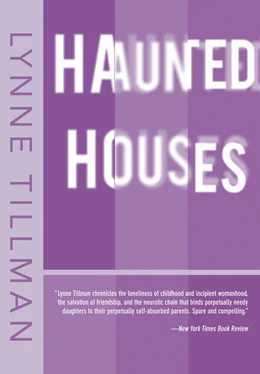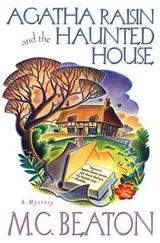Lynne Tillman - Haunted Houses
Здесь есть возможность читать онлайн «Lynne Tillman - Haunted Houses» весь текст электронной книги совершенно бесплатно (целиком полную версию без сокращений). В некоторых случаях можно слушать аудио, скачать через торрент в формате fb2 и присутствует краткое содержание. Год выпуска: 2011, Издательство: Red Lemonade, Жанр: Современная проза, на английском языке. Описание произведения, (предисловие) а так же отзывы посетителей доступны на портале библиотеки ЛибКат.
- Название:Haunted Houses
- Автор:
- Издательство:Red Lemonade
- Жанр:
- Год:2011
- ISBN:нет данных
- Рейтинг книги:5 / 5. Голосов: 1
-
Избранное:Добавить в избранное
- Отзывы:
-
Ваша оценка:
- 100
- 1
- 2
- 3
- 4
- 5
Haunted Houses: краткое содержание, описание и аннотация
Предлагаем к чтению аннотацию, описание, краткое содержание или предисловие (зависит от того, что написал сам автор книги «Haunted Houses»). Если вы не нашли необходимую информацию о книге — напишите в комментариях, мы постараемся отыскать её.
, Tillman wries of the past within the present, and of the inescapability of private memory and public history. A caustic account of how America makes and unmakes a young woman.
Haunted Houses — читать онлайн бесплатно полную книгу (весь текст) целиком
Ниже представлен текст книги, разбитый по страницам. Система сохранения места последней прочитанной страницы, позволяет с удобством читать онлайн бесплатно книгу «Haunted Houses», без необходимости каждый раз заново искать на чём Вы остановились. Поставьте закладку, и сможете в любой момент перейти на страницу, на которой закончили чтение.
Интервал:
Закладка:
What Emily read she became, identifying with the hero or heroine, the protagonist or the ideas, much as she did when she watched movies and cried. To this becoming her dictionary was a map, and learning new words was like leaving home. A map picked at indiscriminately. “Pastiche…hodgepodge.” “Passionate…easily aroused to anger; capable of intense feeling; see ardent, fervid, fervent.” “Imperialism…the policy, practice, or advocacy of extending power and dominion of a nation…” Looking up words she knew or thought she knew reassured her. Finding out that she was wrong scared her. Any sort of discovery, especially of contradiction, satisfied her. Her men’s army pants had shredded at the inner thigh and, unable to sew, she took an old T-shirt, cut a swatch, and sewed it badly to the crotch and down the inner leg. It looked more like a bandage than a patch but the hole was covered. She flipped to the back of the dictionary. “Vicarious…serving instead of someone or something else; in the existence of another.” She liked that phrase. “Victualler…the keeper of a tavern.” “Violence…an exertion of physical force; outrage; fervor.” “Virago…a woman of great stature; a loud, overbearing woman.” “Virtuoso…one who excels.” Passionate, fervid; violence, fervor. She repeated fervid a few times, thought about having a fever, then looked up furtive. It seemed to her that there should have been more connection between passion and stealth, but there wasn’t. She was dissatisfied but did not feel her worst, which was reserved for those times when she felt there was nothing to say at all.
It is a strange experience for whoever regards himself as the One to be revealed to himself as otherness, alterity.
Christine told Emily she had an intelligent face and Emily answered that she could fool people with makeup, but it was difficult to keep up appearances. Emily was reading The Second Sex , and Christine, Memoirs of a Dutiful Daughter . De Beauvoir’s discussion of narcissism, her comments on makeup, the subject of their discussion. “In a woman dressed and adorned, nature is present but under restraint by human will remolded near to man’s desire.” If you look up desire in the dictionary, Emily said, it says that it’s an impulse, a conscious one, toward something that promises satisfaction in its attainment. Christine thought that sounded too clinical. And Emily said she resented having to do anything about her appearance, that when she put on makeup she felt like she was giving in. Christine said she couldn’t stand the way she looked without makeup, and that Emily needed to be more narcissistic. When she was with a man she slept with her makeup on, she told Emily. The man’s desire. Emily asked, “Even your false eyelashes? What if one fell off in the middle of the night?” “I always get up before he does,” Christine said. At their local bar they invented the term facial imperialism, while they watched couples from a small table. They talked about school. Edith. De Beauvoir and Sartre. Emily watched herself, careful not to say the wrong thing to Christine, who she thought misinterpreted easily. She peered at Christine’s face closely. Emily squinted, causing Christine to think she was upset. She didn’t like the way Christine told her what to do when she wasn’t asked. She hated her makeup, thought it made her look like a doll. Emily told herself that if Christine wanted to look like a doll, that was her business. Christine watched Emily’s face, its blankness masking what Christine knew to be anger, based, she felt, on jealousy. Emily smiled and said, If you want me to I’ll take your books back to Forty-second Street when I go. Then they both smiled, and Emily hated herself.
I knew that she thought much less of me than I thought of her. Emily felt better sitting in front of her typewriter than in that bar, and plunged into her paper on Puritanism. The Puritans were dissatisfied in England and the English Church was dissatisfied with them. America was to be their Holy Kingdom. But because of the schizophrenic quality of their tenets, the Puritans worked feverishly without hope. (Or should that be doubled-edged quality? and worked fervently?) Hopelessness, the riverbed of the American drive for material wealth. Hopelessness was at the bottom of everything. Sin was inevitable. No one ever knew if they were of the elect. In a new world, one without tradition or order, the Puritan work ethic could be the driving force for the new settlers, throwing them into a frenzy. How to show their goodness, their saintliness? It follows that paranoia and materialism walk hand in hand (does that really follow?). And fame will become the visible proof of God’s love or approval.
Professor Wilson would want her to back up these statements with proof. Can anything be proved? Maybe all you can do is pretend you don’t have to. Emily Dickinson turned away from that society, shut herself off from it. She wasn’t trying to be seen to be doing good. She was either a lesbian or in love with a married man. And then she retired. Dickinson used that word somewhere. “Retire…to withdraw from action or danger.” I wish I’d been a transcendentalist. She pictured a cottage in the country. Behind it was a forest, a small animal darting around the trees. This kind of image requires sun, and it was sunny where the giant trees weren’t blocking it. There was a stream too, and sometimes she’d see herself in a large flowered bonnet, wading in the water. There’d be a gruff voice or two in the background. She wouldn’t be entirely alone. Keith rang the buzzer; it was midnight. He was wearing black shades and a leather band around his wrist. Emily threw on her army pants and fervently hoped that the patch wouldn’t descend during the night. They went out. What have you been doing? Why are you in such a crummy mood? Do you want to have a meal or not? Let’s go back to your place. I like it here. I don’t know. I think it’s kind of weird this way. We’re a hodge-podge. Oh, Emily, he whispered into her ear, we’re both too weird, that’s all. He bit her on the neck, and the cabdriver took them back to her place. He wouldn’t tell her if he was in love with anyone else, and besides, he said, why should it matter. He told her she had beautiful breasts and fell asleep.
A naive young girl is caught by the gleam of virility; what she always wants is for her lover to represent the essence of manhood.
She is at a party and she is the only girl. She assumes there are other girls somewhere, but she cannot see them. There are birthday decorations on the ceiling and walls; she is fourteen. The boys call her by another name. She is not Emily. They ask her if she wants to do it and she says yes. They tie her hands behind her, just in case, one says, and in the corner of this basement, each boy fucks her.
She slept and felt she hadn’t, woke, saw Keith on the floor, feel back to sleep as if it were her lover. When they did wake up he played another tape for her and asked her what she thought. She didn’t know. It was all right. His eyes were big and black, his lower lip fuller than his upper lip. It’s okay, she said again. He stood and walked to the bathroom at the edge of her small room and stretched. For a moment she thought he did that deliberately, to entice her. But she wasn’t, and whatever she did feel for him wasn’t what he or Christine thought. She had no desire for him. The idea itself infuriated her and she hated Christine for thinking it. He pulled his T-shirt down, over his head, and with his head covered she stared at his nipples, which were brown and wide with a few black hairs growing from them. His strong arms didn’t fit his image of waste, decay, and his skin was so pale, she thought of Hilda. So pale and unblemished it appeared indifferent to pain, unused to needles. The other guy was getting more attention than he was. It’s the singer-not-the-song kind of discussion. Emily sat coiled up on her skinny bed, her arms wrapped around her, then he left.
Читать дальшеИнтервал:
Закладка:
Похожие книги на «Haunted Houses»
Представляем Вашему вниманию похожие книги на «Haunted Houses» списком для выбора. Мы отобрали схожую по названию и смыслу литературу в надежде предоставить читателям больше вариантов отыскать новые, интересные, ещё непрочитанные произведения.
Обсуждение, отзывы о книге «Haunted Houses» и просто собственные мнения читателей. Оставьте ваши комментарии, напишите, что Вы думаете о произведении, его смысле или главных героях. Укажите что конкретно понравилось, а что нет, и почему Вы так считаете.












